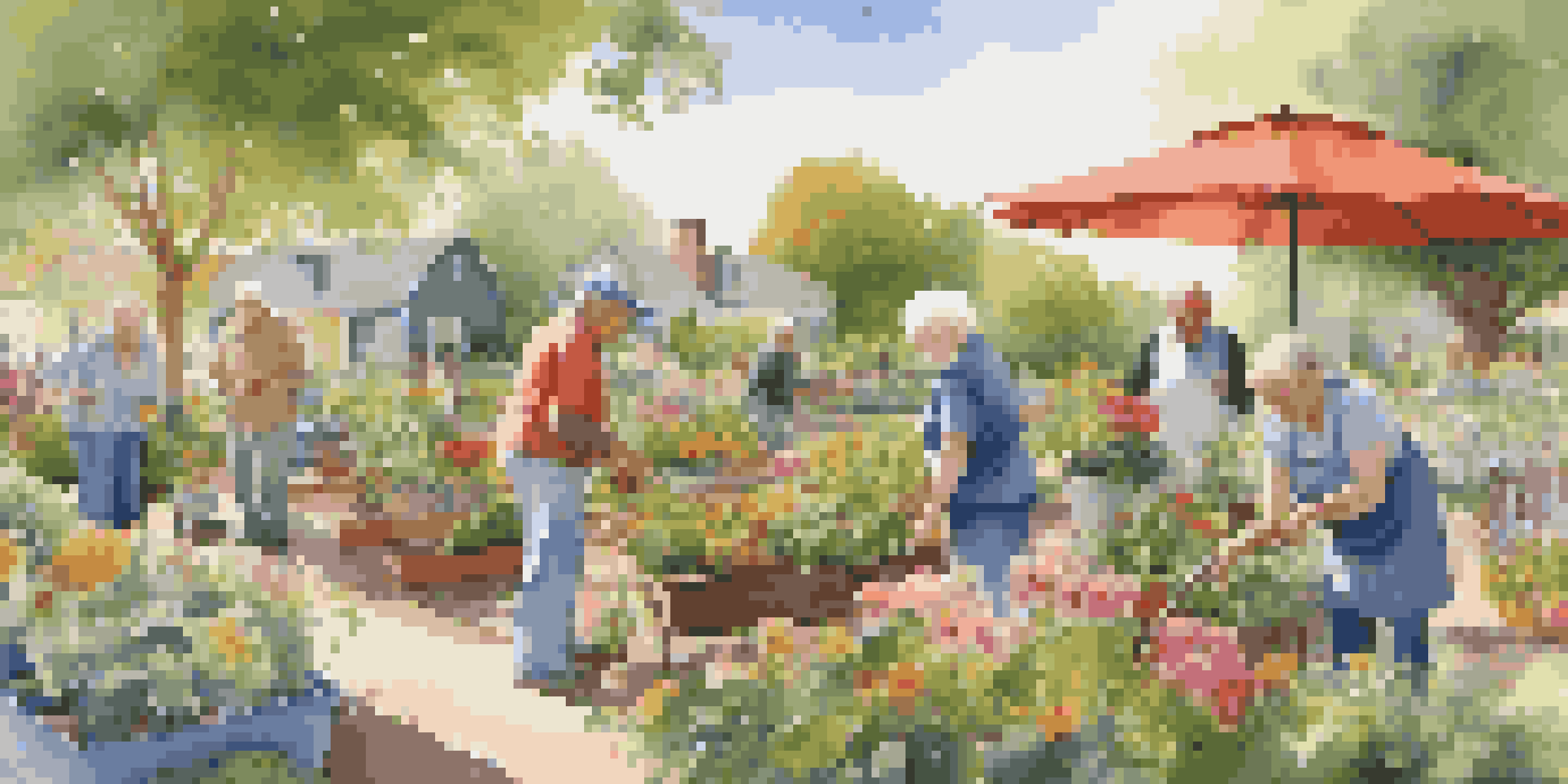The Role of Community Engagement in Promoting Healthy Aging

Understanding Healthy Aging and Its Importance
Healthy aging is more than just the absence of illness; it's about maintaining physical, mental, and social well-being as we grow older. This holistic perspective emphasizes that aging can be a positive phase of life, filled with opportunities for personal growth and fulfillment. Understanding this concept helps communities foster environments that support older adults in living their best lives.
Aging is not lost youth but a new stage of opportunity and strength.
The World Health Organization defines healthy aging as the process of developing and maintaining the functional ability that enables well-being in older age. This includes not just health but also the ability to engage in activities that matter to individuals. By promoting healthy aging, we empower seniors to take charge of their lives and stay active participants in their communities.
Community engagement plays a pivotal role in this process, providing avenues for social interaction, access to resources, and opportunities for meaningful contributions. When older adults are involved in their communities, they experience increased happiness, reduced feelings of isolation, and enhanced overall health.
The Benefits of Community Engagement for Seniors
Engaging with the community can bring a plethora of benefits for seniors, from improved mental health to enhanced physical well-being. Social interaction stimulates cognitive function and can help stave off issues like depression and anxiety, which are common among older adults. Moreover, when seniors participate in community events, they often find a renewed sense of purpose.

Physical activities, such as walking groups or gardening clubs, not only promote fitness but also encourage socialization. These interactions can lead to friendships that provide emotional support, making it easier for older adults to cope with life's challenges. Additionally, being part of community initiatives can boost self-esteem as seniors feel valued and recognized.
Healthy Aging Emphasizes Well-Being
Healthy aging involves maintaining physical, mental, and social well-being, allowing older adults to thrive in their communities.
Moreover, community engagement opens the door for learning and skill development. Workshops, classes, or volunteer opportunities allow older adults to share their knowledge and pick up new skills, contributing to their sense of accomplishment and independence.
Creating Inclusive Community Programs
To effectively promote healthy aging, communities must create inclusive programs that cater to the diverse needs of older adults. This means considering various factors such as mobility issues, cultural backgrounds, and differing interests. Programs that are accessible and welcoming can significantly enhance participation rates among seniors.
The greatest gift of life is friendship, and I have received it.
For instance, offering transportation services to community events can eliminate barriers for those who may struggle with mobility. Similarly, having events that celebrate different cultures can help older adults from various backgrounds feel included and valued. This sense of belonging is crucial for mental and emotional well-being.
Additionally, involving older adults in the planning of community programs ensures that their voices are heard and their needs are met. When seniors help shape initiatives, they are more likely to engage and participate actively, leading to a vibrant community atmosphere.
The Role of Technology in Community Engagement
In today's digital age, technology plays a significant role in enhancing community engagement for seniors. Virtual platforms can connect older adults with peers and community resources, especially for those who may face mobility challenges. Online workshops, virtual meetups, and social media groups can bridge the gap and foster connections.
Moreover, technology can be a powerful tool for information dissemination. Community centers can utilize websites and apps to keep seniors informed about events, health resources, and support services. This proactive approach ensures that older adults are not left out of the loop, encouraging them to participate actively.
Community Engagement Boosts Health
Active participation in community activities enhances seniors' mental and physical health while reducing isolation.
However, it's essential to provide training to help seniors navigate these digital tools. By equipping them with the necessary skills, communities can empower older adults to engage fully and confidently in the digital landscape, enhancing their overall quality of life.
Intergenerational Engagement and Its Impact
Intergenerational engagement is a unique approach that brings together different age groups, fostering relationships and understanding between them. Programs that encourage interactions between seniors and younger generations can lead to mutual benefits, creating a sense of community and shared purpose. For example, mentorship programs can allow seniors to share their wisdom while younger individuals can offer fresh perspectives and energy.
These interactions can combat stereotypes about aging and help younger generations appreciate the value older adults bring to society. By participating in activities like storytelling sessions or collaborative projects, seniors can pass down their knowledge and skills, which can be deeply rewarding for both parties. This exchange enriches the community fabric and creates bonds that transcend age.
Furthermore, such programs can help reduce feelings of isolation among older adults. When they build relationships with younger individuals, they often feel more connected and valued, leading to improved mental and emotional health.
The Importance of Volunteerism in Aging
Volunteering is a powerful way for older adults to stay engaged and contribute to their communities. It provides them with a sense of purpose and fulfillment, which can significantly enhance their quality of life. Volunteering can take many forms, from helping at local food banks to participating in community clean-up efforts, allowing seniors to choose activities that resonate with their interests.
Moreover, volunteering can lead to new social connections, reducing feelings of loneliness and isolation. As seniors work alongside others, they build friendships and support networks, which are crucial for overall well-being. The act of giving back not only benefits the community but also promotes a sense of belonging and accomplishment among older adults.
Volunteerism Fosters Purposeful Living
Volunteering provides older adults with a sense of purpose and fulfillment, promoting both personal well-being and community connection.
Additionally, research shows that volunteering can have positive impacts on physical health, including lower blood pressure and improved mental health. This is a win-win situation where seniors contribute to society while simultaneously enhancing their health and happiness.
Measuring the Impact of Community Engagement
To truly understand the benefits of community engagement on healthy aging, it’s essential to measure its impact. Gathering data through surveys, interviews, and feedback from participants can provide valuable insights into how programs affect older adults' well-being. These assessments help identify what works, what doesn't, and how to refine initiatives for better results.
Moreover, tracking metrics like participation rates, health outcomes, and social connections can demonstrate the tangible benefits of community engagement. This evidence can be instrumental in securing funding and support for ongoing and future programs, ensuring they continue to thrive and meet the needs of seniors.

Engaging older adults in the evaluation process is also beneficial. Their feedback can lead to improvements that make programs more responsive and effective. By maintaining a cycle of engagement, evaluation, and adaptation, communities can create sustainable environments that promote healthy aging for everyone.